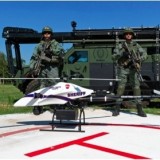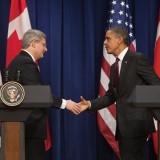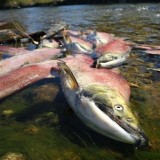The second of three extra days of hearings at the Cohen Commission into disappearing Fraser River sockeye yielded more surprises – the biggest of which came in the form of a telling internal email strain between DFO and Canadian Food Inspection Agency staff. The emails were sent following a teleconference for media hosted by the two departments, aimed at quelling concerns over the recent discovery of Infectious Salmon Anemia virus in wild BC salmon.
In a message dated November 9, 2011, Joseph Beres, an inspection manager at the CFIA, wrote to colleague Dr. Con Kiley and other senior DFO and CFIA staff who had appeared on the conference call:
Con,
It is clear that we are turning the PR tide to our favour – and this is because of the very successful performance of our spokes[people] at the Tech Briefing yesterday – you, Stephen, Peter and Paul were a terrific team, indeed. Congratulations! One battle is won, now we have to nail the surveillance piece, and we will win the war also.
Cheers, Joe.
In the same strain, Dr. Kiley replies, “Concentrate on the headlines, that’s often all that people read or remember. Both the ‘Top Stories’ and the ‘Related Pieces’.” (emphasis added)
And it appears Dr. Kiley really knows of what he speaks. That conference call and a subsequent one several weeks later – at least temporarily – removed some of the pressure from his department, as many media outlets in Canada and around the world ran with their talking points.
Commission Counsel Brock Martland asked another CFIA representative on the stand Friday, Dr. Kim Klotins, Acting National Manager for Disease Control Contingency Planning, what she thought Mr. Beres was thinking went he sent the above email. After much stammering, she replied, “We may get a little bit exuberant internally, but…I really can’t speak to what he was thinking during this.”
Mr. Martland questioned the “adversarial” attitude displayed in the emails, suggesting it smacks more of hockey players than scientists in pursuit of truth.
Further testimony heard by the Inquiry on Friday and throughout the previous day’s session demonstrate the tactics these officials were using to knowingly cover up the discovery of ISAv in BC. Earlier that morning, the Inquiry heard from Dr. Fred Kibenge, director of the Animal Veterinary College at the University of PEI – one of only two approved testing labs for the ISA virus sanctioned by the world animal health organization. Dr. Kibenge related the enormous political pressure he faced after confirming ISAv in two wild salmon from BC.
Under questioning from the conservation coalition’s counsel Karen Campbell, Dr. Kibenge described an inspection his lab faced by the CFIA soon after discovering the positive test results. “The inspection was meant to be about understanding my processes so they could improve their own practices, but once the inspection began I got the sense that it was about obtaining information, because the first thing they asked me about when they did the inspection was the samples.” Dr. Kibenge added, “I quickly realized that the purpose of the site visit…was actually in my view, to confirm a hypothesis that had already been presented in the media.”
On the stand beside Dr. Kibenge was Dr. Nellie Gage, who heads up the Moncton-based lab that found contradictory results upon which the CFIA seized to publicly invalidate Dr. Kibenge’s findings. The Inquiry learned that far from confirmed “negative” tests for ISAv in these wild fish, Dr. Gagne’s lab had also turned up a weak positive, which it discounted based on its inability to repeat the result. Yet, rather than call the tests “inconclusive” as they were, the CFIA described them as “negative”, which was plainly not the case.
To that end, Alexandra Morton’s counsel Greg McDade asked Dr. Gagne, “Did you ever speak out to your communications people, suggesting that DFO was misleading people based on your inconclusive results?” Gagne admitted, “No, I have not.” McDade also put to Gagne a media statement from the BC Salmon Farmers’ Association in which head lobbyist Mary-Ellen Walling declared unequivocally that Gagne’s “negative” findings proved Dr. Kibenge had been wrong and that ISA was confirmed not to be in BC. A weary-sounding Gage produced a few chuckles in the gallery when she retorted, “Do you know how many things are wrong that have been published up until know? That’s really just a drop in the bucket.” (emphasis added)
Dr. Kibenge explained he was concerned when he later learned that the Moncton lab had been consulted ahead of time as to what issues to look for at his lab. “Did CFIA consult you in a similar way about possible issues with the Moncton lab?” Campbell inquired. “No, they did not,” replied Kibenge.
Counsel for the aboriginal aquaculture coalition later asked Dr. Kibenge whether he feels there have been threats to him professionally and financially as a result of the criticism leveled at him and his lab over these ISAv tests. Dr. Kibenge responded, “This has been so public that my reputation and everything else has been questioned, so yes, you could say that.”
McDade followed up on this theme of political pressure on Dr. Kibenge when he asked, “If you had found a negative you would not have submitted to that pressure, right?” Kibenge’s answer: “Yes.” McDade continued, “Why such pressure because of a simple scientific finding?” to which Kibenge replied, “It’s a problem when the science is above any question, as was the case here.”
Dr. Kibenge intimated in his testimony that he understood why the Harper government was reacting this way, given the amount of money at stake with threats to the aquaculture industry from his findings. He was also sure to acknowledge the support of his college and university, suggesting that made it easier to deal with these attacks on his lab and professional integrity.
More emails released during Friday’s hearing revealed the lengths to which senior CFIA and DFO staff went to clamp down on Dr. Kibenge’s work. One note from Dr. Klotins to Dr. Kiley stated, “Dr. Kibenge did test the fish submitted by A. Morton. I believe we must check those samples for integrity. I’m thinking we should also advise all laboratories in Canada to not test any more samples of wild finfish for ISAv from the Pacific Ocean (Canada and US). K.” (emphasis added)
When pressed by McDade, Klotins downplayed the email, suggesting no further action came of it.
Commission Counsel Brock Martland posed a similar question to senior DFO manager Stephen Stephen, who took the stand in the afternoon. This time it was in reference to his alleged attempts to shut down the research into ISAv being conducted on the Pacific Coast by Dr. Kristi Miller. “Did you suggest Dr. Miller shouldn’t continue her ISAv research?” Martland inquired. Stephen answered, “I did suggest that until CFIA completes their investigation we should defer further testing.” Martland asked Stephen, “Was Kristi Miller’s discovery of ISAv a ‘game-changer’?” Stephen replied, “I don’t think it’s a game-changer at all,” followed by more of the party line about conducting further tests before jumping to any conclusions.
The day ended with yet another example of DFO covering up ISAv science. This time it involved an unpublished 2004 paper by Dr. Fred Kibenge’s wife, Molly Kibenge, which made headlines when it was leaked to media a few weeks ago. Dr. Jones headed up the lab where Kibenge was a post-doctoral student at the time of the paper and it was his decision not to publish it. Moreover, Jones also didn’t see fit to disclose the document to the Commission, even though he was legally required to – especially given its significance relative to these special hearings into ISAv.
Martland asked Jones, “Why didn’t you produce these documents to the Commission earlier? Didn’t you understand this was going to be an issue?” “No, I didn’t understand that,” replied Jones. “The concern that we had with Molly’s work was that we were not able to reproduce her findings. At the time it was just confusing and didn’t seem to have meaning…It was essentially a negative result.”
Essentially. Just not actually.
The Cohen Commission resumes Monday for one final day of special hearings into ISAv – when it is expected Jones, Stephen and others will face more tough questions on the cover-up of science related to the potentially deadly virus.





